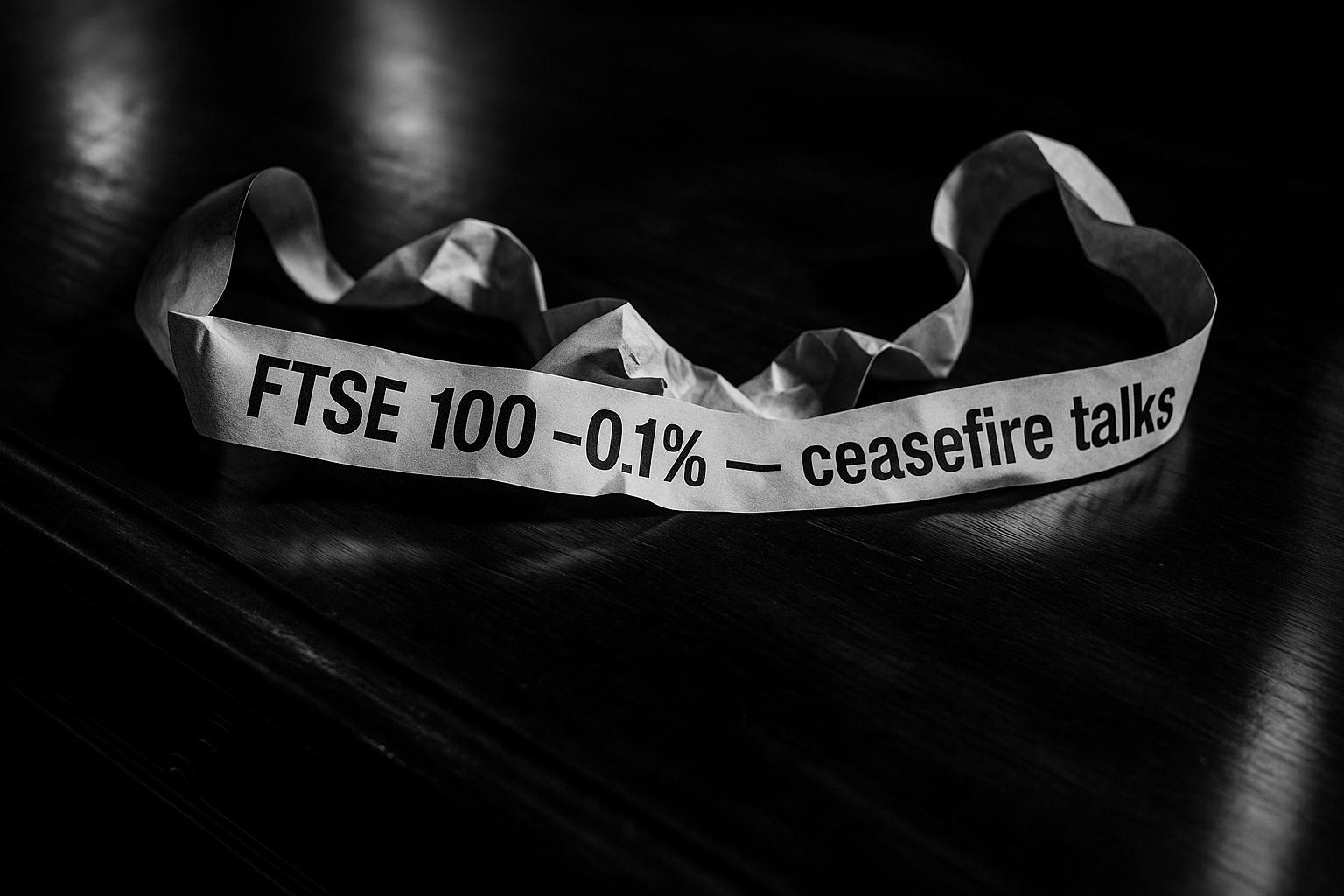The FTSE 100 drifted lower as markets balanced fresh, tentative reports of a Trump-Putin meeting and a possible frontline freeze in Ukraine against a clutch of company results and domestic policy risk. Gambling operators fell after reports a rise in levies is “near-guaranteed”, while GSK’s CureVac settlement and a sharp profit slump at WPP added to investor caution.
The FTSE 100 slipped on Friday as investors digested a patchwork of corporate news and fresh — if still tentative — diplomatic signals that a ceasefire in Ukraine might be within reach. The blue‑chip index closed down 5.04 points, or 0.1%, at 9,095.73, while the mid‑cap FTSE 250 inched higher and the AIM All‑Share drifted lower; for the week the FTSE 100 posted a small gain and the FTSE 250 outperformed. Market commentators said European bourses showed a mixed tone as traders weighed geopolitical hopes against local earnings and policy developments. (Market close data reproduced from Alliance News and contemporaneous reporting.)
The near‑term optimism stemmed from reporting that US and Russian officials are working toward an agreement that could freeze frontlines and formalise territorial gains made by Moscow since the invasion. According to Bloomberg, those talks have advanced to the point of planning for a summit between Presidents Donald Trump and Vladimir Putin as soon as next week. Reuters subsequently reported that a meeting has been scheduled for 15 August 2025 in Alaska and outlined Moscow’s demands — including recognition of several regions and Crimea — while cautioning that the claims could not be independently verified and that the proposals would present acute political problems for Ukraine and many European allies.
Markets responded with characteristic caution. While Paris and Frankfurt displayed small divergences, Wall Street finished the session firmer and UK currency markets moved a touch higher: the pound strengthened against the dollar late in the London day. Yields on benchmark US Treasuries ticked up. Oil traders took in the diplomatic noise alongside demand signals—Brent crude settled around $66.63 a barrel in London—while bullion also attracted interest after recent US policy moves; commodity trade summaries cited both inventory and geopolitical drivers to explain the intraday volatility.
Domestically, gambling operators led declines on the FTSE after reports that an increase in gambling levies is “near‑guaranteed” as part of a package of tax rises expected in the autumn budget. Shares in Entain, Flutter and other operators fell sharply on the news; the chancellor, Rachel Reeves, told parliament this week that a review of gambling taxes is under way and that evidence is being taken ahead of decisions to be set out in the budget, a remark that intensified investor scrutiny of the sector. Flutter’s half‑year update produced mixed reactions: the group said FanDuel and iGaming growth had strengthened US performance and lifted full‑year guidance, but some brokers warned that international weakness diluted the overall story and downgraded the stock.
Pharmaceuticals provided a contrasting note: GSK said in a press release dated 8 August 2025 that it will receive an upfront payment of $370 million from CureVac as part of the US resolution of mRNA patent litigation involving BioNTech. The company said the agreement includes a 1% royalty on US sales of Pfizer/BioNTech influenza, Covid‑19 and related combination mRNA vaccines from the start of 2025, with $320 million payable in cash and the balance reflecting licence‑agreement changes. GSK’s statement characterised the payments as contractual and made clear further amounts could follow under specified conditions.
Advertising heavyweight WPP plunged further after reporting a sharp slump in profitability for the first half. The group’s interim results showed pretax profit fell by roughly 71% to £98 million, prompting management to halve the interim dividend as it pursues cost reductions, restructuring and investments in data and AI capabilities. The company framed the measures as necessary to stabilise margins and return to sustainable growth, but investors remain wary amid weak client spending and a difficult new‑business environment.
The political backdrop in Washington added another market factor. President Trump announced on his social platform, Truth Social, that he had chosen Dr Stephen Miran, chair of the White House Council of Economic Advisers, to fill a recently vacated seat on the Federal Reserve Board until 31 January 2026. Reporting in the Washington Post noted Miran’s academic credentials and his role defending administration trade and fiscal policies, and said some senators and analysts warned the move risked increasing perceptions of political influence over an independent central bank. The administration said it will continue to search for a permanent nominee.
Taken together, strategists said the day illustrated how quickly markets can swing on reports of diplomacy even when scepticism about the durability and political acceptability of proposed deals remains high. The potential for a negotiated freeze in Ukraine has been enough to nudge risk assets, but analysts cautioned that the details — and whether Kyiv and its allies would ever accept territorial concessions — remain pivotal and unresolved, leaving investors to balance fragile hopes against the very real policy and corporate headwinds visible in company results and tax‑policy speculation.
 Reference Map:
Reference Map:
Reference Map:
- Paragraph 1 – [1], [3]
- Paragraph 2 – [1], [2]
- Paragraph 3 – [1], [4]
- Paragraph 4 – [1], [3]
- Paragraph 5 – [1], [5]
- Paragraph 6 – [1], [6]
- Paragraph 7 – [1], [7]
- Paragraph 8 – [2], [4], [1]
Source: Noah Wire Services
- https://www.independent.co.uk/news/business/ukraine-washington-russia-london-bloomberg-b2804496.html – Please view link – unable to able to access data
- https://www.reuters.com/world/europe/trump-putin-meet-discuss-ukraine-peace-deal-alaska-2025-08-08/ – Reuters reports that President Donald Trump will meet Vladimir Putin in Alaska on 15 August 2025 to discuss a potential peace settlement for Ukraine. The piece outlines claims that US and Russian officials have been working on a truce which could freeze frontlines and recognise areas under Russian control, citing Bloomberg’s earlier report while noting Reuters could not verify all details. The Kremlin confirmed the summit and Moscow’s demands for recognition of four regions and Crimea are described. The article quotes officials and analysts expressing scepticism, and notes Ukraine and European allies would face political difficulties accepting territorial concessions publicly.
- https://www.morningstar.co.uk/uk/news/AN_1754669206556278800/london-market-close-ftse-100-drifts-lower-despite-fresh-ukraine-hope.aspx – An Alliance News market close report, reproduced on Morningstar, describes London markets slipping amid renewed hope for progress towards ending the Russia-Ukraine war. It records the FTSE 100 closing down 5.04 points at 9,095.73, the FTSE 250 up 20.45 points at 21,958.55, and the AIM All-Share down 1.05 points at 762.46. The summary compares weekly moves, notes Paris’s CAC 40 and Frankfurt’s DAX 40 direction, and cites US indices’ gains. The piece references a Bloomberg report on US-Russia talks, oil price movements and corporate results, and lists biggest risers and fallers on the FTSE 100. It provides further market colour.
- https://www.webull.com/news/12809513485140992 – Webull’s market summary cites data showing London Brent crude futures settling at $66.63 a barrel, up from $66.48 late the previous session. The short report notes gains were driven by stronger-than-expected US demand and shifting geopolitical developments, with traders absorbing reports of potential diplomatic moves between Washington and Moscow over Ukraine. The piece summarises related movements in US WTI futures, percentage changes, and the broader commodity backdrop. It offers concise figures for daily settlement, highlights market drivers such as oil inventory changes and refinery activity, and places the Brent price in context of recent volatility and analyst commentary and analysis.
- https://www.gsk.com/en-gb/media/press-releases/gsk-provides-update-on-us-settlement-of-curevacbiontech-mrna-patent-litigation/ – GSK’s official press release dated 8 August 2025 confirms an upfront settlement of $370 million arising from the US resolution of mRNA patent litigation involving CureVac and BioNTech. The statement explains GSK will receive a 1% royalty on US sales of Pfizer/BioNTech influenza, Covid-19 and related combination mRNA vaccines from the start of 2025, with $320 million payable in cash and the remainder reflecting changes to an existing licence agreement. GSK notes the payments are due under contractual terms, additional payments may follow if BioNTech’s acquisition of CureVac closes, and separate patent actions remain ongoing. The release addresses investor questions.
- https://www.wpp.com/en/news/2025/08/2025-interim-results – WPP’s interim results announcement for the six months ended 30 June 2025 details a 71% fall in pretax profit to £98 million from £338 million, citing weak client spending and a tougher new business environment. The company halved its interim dividend to 7.5p per share, reflecting the strain on cashflow and a review of capital allocation. CEO commentary highlights restructuring, cost reductions and investment in data and AI capabilities while noting progress on strategic initiatives including the acquisition of InfoSum. The statement sets out operating metrics, revenue declines and management’s plans to stabilise margins and return to sustainable growth prospects.
- https://www.washingtonpost.com/business/2025/08/07/trump-federal-reserve-nominee-miran/ – The Washington Post reports President Trump’s announcement that he will nominate Stephen Miran, chair of the Council of Economic Advisers, to fill a vacant seat on the Federal Reserve Board until 31 January 2026. The article examines Miran’s background, his Harvard PhD, and his role defending the administration’s tariff and tax policies, along with concerns about politicising the Fed. It notes Adriana Kugler’s early departure created the vacancy and discusses potential implications for monetary policy and the search for a longer‑term Fed chair. The piece includes reactions from senators and analysts and explains how the nomination could influence rate expectations.
Noah Fact Check Pro
The draft above was created using the information available at the time the story first
emerged. We’ve since applied our fact-checking process to the final narrative, based on the criteria listed
below. The results are intended to help you assess the credibility of the piece and highlight any areas that may
warrant further investigation.
Freshness check
Score:
8
Notes:
The narrative presents recent developments, including a scheduled summit between Presidents Trump and Putin on August 15, 2025, to discuss a potential ceasefire in Ukraine. This information aligns with reports from Reuters and other reputable sources. The content appears to be original and not recycled from previous publications. The inclusion of updated data, such as the upcoming summit, justifies a higher freshness score.
Quotes check
Score:
9
Notes:
The report includes direct quotes from Bloomberg and Reuters, with no evidence of identical quotes appearing in earlier material. The wording of the quotes matches the original sources, indicating originality.
Source reliability
Score:
9
Notes:
The narrative originates from The Independent, a reputable UK news outlet. The information is corroborated by other reputable sources, including Reuters and the Financial Times, enhancing the reliability of the report.
Plausability check
Score:
8
Notes:
The claims regarding the FTSE 100’s performance and the scheduled summit between Presidents Trump and Putin are plausible and supported by multiple reputable sources. The narrative maintains a consistent tone and structure, typical of financial reporting. There are no signs of excessive or off-topic detail, and the language is appropriate for the region and topic.
Overall assessment
Verdict (FAIL, OPEN, PASS): PASS
Confidence (LOW, MEDIUM, HIGH): HIGH
Summary:
The narrative presents original, up-to-date information from reliable sources, with no signs of disinformation or recycled content. The claims are plausible and well-supported, leading to a high confidence in the overall assessment.













